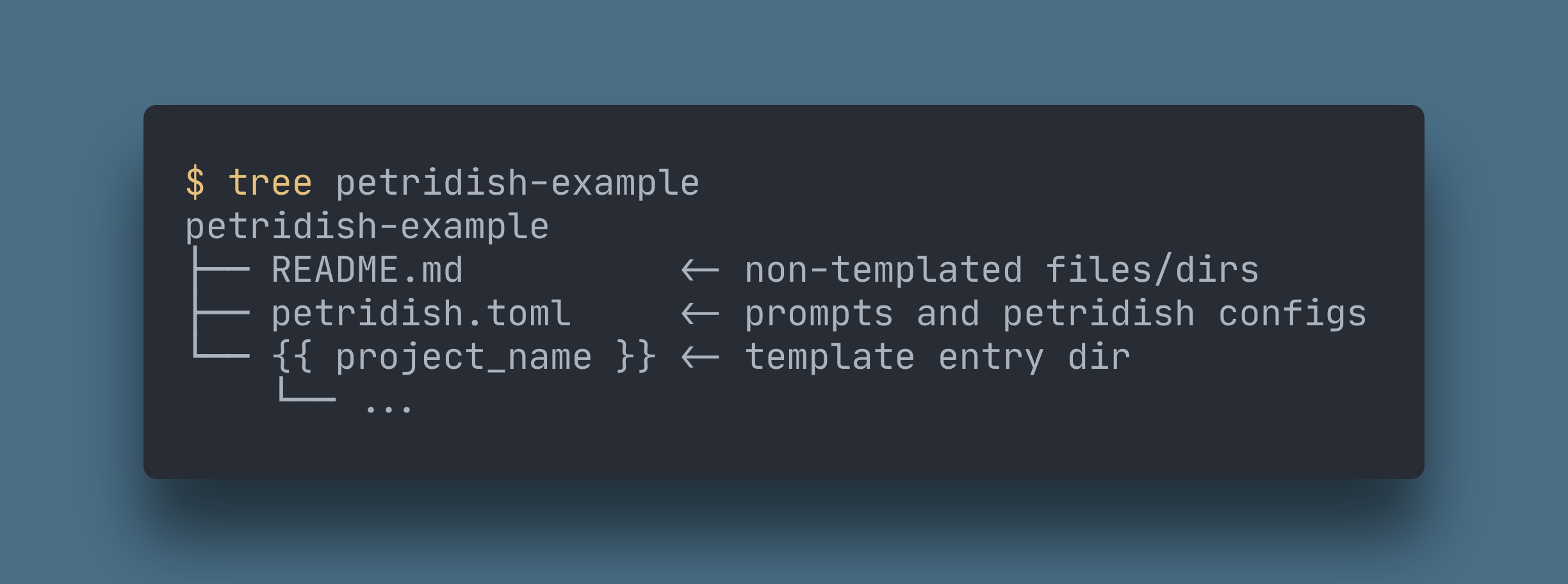If you have heard of the [`cookiecutter`](https://github.com/cookiecutter/cookiecutter) project, `petridish` is a rust implementation of it.
## Features
| Feature | Description |
| ------------------------------- | -------------------------------------------------------------------------------------------------------------------------------------------------------------------------- |
| **Cross platform** | Windows, Linux, MacOS |
| **More flexible configuration** | `petridish` use toml file to define the template variables |
| **More humanized prompt** | support different kinds of prompt (`input`, `select`, `multi select`, `confirm`) |
| **Powerful template engine** | we use [`tera`](https://github.com/Keats/tera) as our template engine, which is based on Jinja2/Django |
| **One binary** | one binary run everywhere |
| **Manage cached templates** | If you download a remote template, it will be cached, so later you can just use its name without download it again. You can also `list` or `remove` these cached templates |
## Usage
Like [`cookiecutter`](https://github.com/cookiecutter/cookiecutter), you should provide directory structure like this:

Let's have a look at the `petridish.toml` file:
```toml
[petridish]
project_prompt = "project name?"
project_var_name = "project_name"
short_description = "This is an awesome template"
[[prompts]]
name = "name"
prompt = "what's your name"
type = "string"
[[prompts]]
name = "age"
choices = [10, 20, 30]
default = 20
type = "number"
[[prompts]]
name = "hobby"
choices = ["running", "swimming"]
multi = true
type = "string"
[[prompts]]
name = "is_geek"
type = "bool"
default = true
```
### Petridish config
| Field | Description | optional |
| ----------------- | ---------------------------------------------------------------------------------------------------- | :------: |
| project_prompt | the prompt message for `project_var_name`, default is `project name?` | ✅ |
| project_var_name | the project var name, default is `project_name` | ✅ |
| short_description | the short description of the template, will show in sub cmd `list` | ✅ |
| long_description | the long description of the template, will show before first prompt (**support Markdown highlight**) | ✅ |
### Prompt config
| Prompt kind | Field | Description | optional |
| ------------ | ------------- | ------------------------------------------------------ | :------: |
| string input | **name** | template var name | |
| | **prompt** | prompt message | ✅ |
| | **default** | default "", support template render | ✅ |
| | **regex** | regex pattern, the prompt value must match the pattern | ✅ |
| | **type** | must be `string` | |
| number input | **name** | template var name | |
| | **prompt** | prompt message | ✅ |
| | **default** | default 0 | ✅ |
| | **min** | the min value | ✅ |
| | **max** | the max value | ✅ |
| | **type** | must be `number` | |
| select | **name** | template var name | |
| | **prompt** | prompt message | ✅ |
| | **choices** | choice items | |
| | **default** | default value | ✅ |
| | **type** | `string` or `number` | |
| multi select | **name** | template var name | |
| | **prompt** | prompt message | ✅ |
| | **choices** | choice items | |
| | **default** | default values | ✅ |
| | **multi** | must be `true` | |
| | **emptyable** | whether value can be empty, default `false` | ✅ |
| | **type** | `string` or `number` | |
| confirm | **name** | template var name | |
| | **prompt** | prompt message | ✅ |
| | **default** | default value (default `false`) | ✅ |
| | **type** | must be `bool` | |
## Remote git abbreviations
`petridish` knows abbreviations for Github(`gh`) and GitLab(`gl`) projects
The format should be like `
